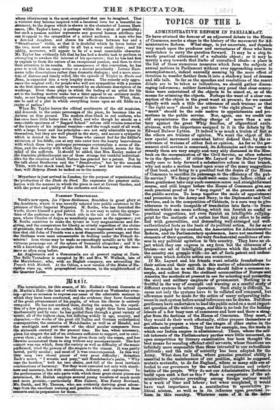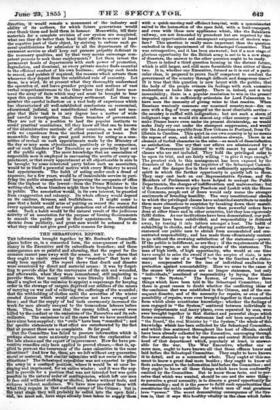TOPICS OF THE L
ADMINISTRATIVE REFORM IN PARLIAMLANT.
To have attained the honour of an adjourned debate in the House of Commons, marks a stage in the history of the movement for Ad- ministrative Reform. What stage, is yet uncertain, and depends very much upon the prudence and earnestness of those who have undertaken to carry the question fbrward. It may be a step to- wards practical attainment of a valuable object ; or it may be merely a step towards that limbo of unrealized ideals—a place in the list of those numerous measures which form the subjects of annual motions in Parliament without ever approaching nearer to accompfishments indeed annually seeming by the mere effect of iteration to wander farther from it into a shadowy land of dreams and idle talk. So far as the speeches and resolutions of the recent debate are to be taken as indications, we should gather discou- raging inferences.; neither furnishing any proof that clear concep- tions were entertained of the objects to be aimed at, or of the means for attaining the objects. Perhaps the want of a clear con- ception of the object is the great want at present; for we cannot dignify with such a title the utterance of such truisms as that "the right men" should be put into "the right places," or that "merit" should be the sole motive to appointments and pro- motions in the public service. Nor, again, can we credit our old acquaintance the standing charge of more than a cen- tury against the great Whig families, of oligarchical exclu- siveness, with the importance assigned to it in the debate by Sir Edward. Bulwer Lytton. It indeed is as much a truism of fact as the others are truisms of opinion. We want the object of this new special movement somewhat better defined than by the re- utterance of truisms of either fact or opinion. As far as the per- manent civil service is concernedy its deficiencies and the means to remedy them are very amply, and very ably discussed in the Blue- book on the reorganization of the Civil Service, so often referred to in- the Spectator. If either Mr: Layard or Sir Bulwer Lytton really care to help forward a substantive reform in that branch, why not make a motion based upon some of the many suggestions of that book, and bring to a practical test the desire of the House of Commons to sacrifice its patronage to the efficiency of the pub- Be service? We fancy we shall wait some time before either of these gentlemen take any such common-sense and straightforward course,, and still longer before the House of Commons give any such practical proof of its " deep regret" at the present state of ,the public service. To lump together the mode of appointment :and promotion in the Army and Navy, in the Diplomatic and Civil -Services, and in the composition. of Cabinets, is a sure way to give
'utterance to words incapable of translation into. facts—to frame • motions. which can mean nothing-, which can furnish no useful or
• practical suggestions, not even furnish an intelligible rallying- - int for the instincts of a nation less than any other to be satis- with generalities,. and demanding well-arranged and well- authenticated facts as the basis of' its political action. So far as at resent judged, by its conduct, the Association for Administrative m, and, its Parliamentary spokesmen, have not mastered the -elements of their question, the veryfundamental conditions of suc- cess in any political agitation. in this country. They have no ob- ject which.they can express in any form but the utterance of a Arniam—no set. of intelligible propositions which the intellect of thesiountry can grapple with—no set of facts patent.and_ undeni- able upon which definite action can commence. If Mr. Layard and his friends want reliable foundations for their the action, and their speech in this matter of administrative re- form, it would be as well that they should follow a common ex- ample, and collect from the civilized communities of Europe and America the methods at present in use for selecting and promoting fruitful in the way of example and warning as a careful study of different systems in actual operation. Such study is difficult, be- cause not only the systems have to be collated and compared, but allowance must be made fir the action of many cooperating influ- ences in each system before sound inferences can be drawn. But these gentlemen have undertaken to lead the public mind on a most import- ant question of the widest range, and this is no task for the holiday leisure of a few busy men of commerce and here and there a strag- gles. from the factions of the House of Commons. They must, if they would do their work effectually, either prepare themselves or -get others to prepare a view of the usages of other states in the matters under question. They have for example, too, the mode in which our Indian empire is administered. There, where the self- ish interests of the Parliamentary parties were little concerned, an open competition by literary examination has been thought the best means for securing efficient civil servants, whose functions are infinitely more responsible than those intrusted to our subordinate politicaLs ; and the rule of seniority has been adopted for the Army. What does for India, where genuine practical ability is essential to the maintenance of our position, might be supposed, mutatis mutandis, to do for England, where so many aids are af- forded to our governors by the settled institutions and orderly habits of the people. Why do not our Administrative Reformers build upon such a fact as this P Such a comparison of the ad- ministrative systems prevailing among foreign nations would be a work of time and labour ; but when completed, it would have vast importance as a contribution to speculative po- litical science, as well as in its influence upon .practical re- form in this country. Whatever came of it ix the latter Zulu. the civil and military employes. of government. Nothing is so direction, it would remain a monument of the industry and ability of its authors, for which future generations would ever thank them and hold them in honour. Meanwhile, till their materials for a complete revision of our system are completed, what can they do better than bend their efforts to secure at least the negative part of their object, by striving to enfinee such ge- neral qualifications for admission to all the departments of 6,0- vernment service as shall keep out persons palpably deficient in the necessary qualities, and by that very means encourage com- petent persons to seek these employments ? Let them invest the permanent heads of departments with such power of promotion, degradation, and dismissal, as every private master finds essential to the efficient conduct of his own business; obliging such heads to record, and publish if required, the reasons-which sotuate them whenever they depart from the established rule of seniority. Let them, in a word, do at present what they thoroughly understand the operation of, and leave grander projects and motions of vast -verbal comprehensiveness to the time when they shall have mas- tered the array of facts which may and must be brought to bear upon this question for its satisfactory settlement. Let them re- member the careful induction on a vast body of experience which has characterized all well-established conclusions on economical; educational, judicial, and constitutional, reforms, and not ima- gine that their task is in any degree less a matter of wide- and careful investigation than these branches of government. They are not in a position to lead the popular instincts to sound practical conclusions, till they know all that can be known of the administrative methods of other countries, as well as' the evils we experience from the method practised at home. But meanwhile they may do great good service by acting as a oem- mittee of revisal on such appointments made by the Minista7 of the day as may seem. objectionable, positively or by comparison, and on such blunders of the Executive as are generally kept out of the public sight. The mere knowledge that an association of respectable men is employed in canvassing the merits of every.ap- pointment, or that every appointment at all objectionable is sure to be brought by some interested party before such an association; would be in itself a powerful motive with every Ministry to avoid bad appointments. The habit of acting under such a dread' of exposure, for a few years, would be of incalculable service in puri- fring the public atmosphere and improving the occupants of office from the highest to the lowest—from the Prime M mister to the writing-clerk, whose blunders might then be brought home to him in public. The association would, in its own interest, be guarded from exaggeration and calumny. Its whole efficacy would depend on its candour, fairness, and truthfulness. It might come- to pass that a habit would arise of putting on record the reason for every appointment, and for every promotion out of due established order. Such a habit would be the natural result of the judicious activity of an association for the purpose of forcing Governments to consult the public good in their appointments. Nepotism shrinks from publicity, and great men would be ashamed to do what they could not give goodpublic reasons for doing.



































 Previous page
Previous page